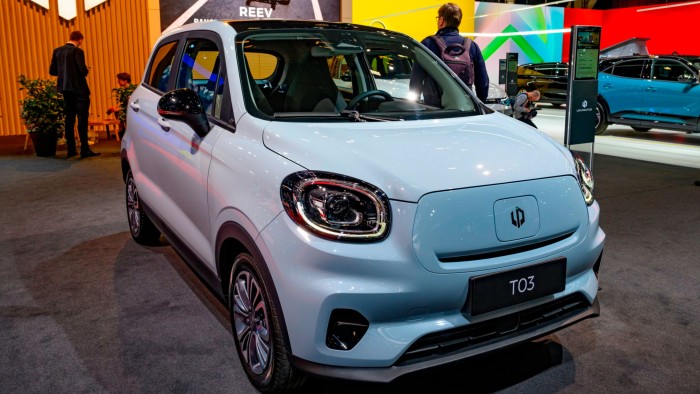Unlock the White House Watch newsletter for free
Your guide to what Trump’s second term means for Washington, business and the world
Chinese carmakers expanding into Europe are being forced to readjust their short-term ambitions as tariff roadblocks have slowed product launches and made their electric vehicles less affordable.
The rapid rise of Chinese-made electric vehicles — with their low pricing and advanced software features — has sparked protectionist measures in both the US and EU, with Brussels last year imposing tariffs of up to 45 per cent on EVs from the country, while the US market remains essentially closed to Chinese carmakers.
The additional costs have weakened the price competitiveness of many companies, while others face problems expanding their distribution networks.
The “difficulties were certainly underestimated in our initial planning”, Nio chief executive William Li said at last week’s Shanghai Auto Show, although he said that the EV company remained “firmly committed” to growing gradually its footprint in Europe.
Despite their declared ambitions, the market share of Chinese brands in Europe and the UK is still small at 4.3 per cent in the first two months of this year, according to automotive analyst Matthias Schmidt.
Last month, Leapmotor chief executive Zhu Jiangming warned that “the 30.7 per cent tariff and 10 per cent shipping cost combined have significantly impacted our competitiveness [in Europe]“.
Stellantis last year bought a 20 per cent stake in Leapmotor in a landmark deal, where the Hangzhou-based start-up’s EVs were to be sold at the Fiat and Peugeot owner’s dealerships in Europe.
But the partnership has already suffered a major setback after Stellantis abruptly halted production of Leapmotor’s T03 small electric model in Poland in late March, without giving a reason publicly.
Poland was among EU nations that voted in favour of the bloc’s tariffs after Brussels concluded that Chinese-made EVs were unfairly subsidised by Beijing.
The company’s priority now is to start production in Europe by the second or third quarter of 2026.
“The anti-subsidy tariffs appear to have slammed the brakes on the penetration progress [of Chinese EVs],” Schmidt said, despite brands such as Xpeng and BYD entering the continent with new models.
The Chinese groups’ share of new EVs in Europe has also fallen from 50 per cent prior to tariffs imposed by Brussels — to 30 per cent — as they shift to more profitable petrol vehicles to avoid the levies.
Nio aims to launch a new small EV under its sub-brand Firefly in more than five European countries by the end of the year, after failing to synchronise the model’s debut with its China launch this month. The company has been struggling to expand its local dealer network in Europe and recently ditched a direct-to-consumer sales model following weak European sales.
Li said it was possible to open 100 showrooms in a single month in China, but “achieving that same pace in Europe is much more challenging, with costs far exceeding our expectations”.
Nevertheless, some Chinese groups are pressing on with expansion plans.
BYD management told Citi analysts in Shanghai the group expected the EU to account for 20 per cent of its vehicle exports this year, up from 15 per cent in 2024, with production set to start in Hungary this year.
Hybrids are driving the projected growth as the vehicles are not subject to EU tariffs and are expected to make up about half of BYD’s exports.
Geely-backed Zeekr also downplayed the impact of EU tariffs on its price competitiveness. “In some countries, the tariffs are high, which is fair to everyone. It’s not a problem,” said Mars Chen, Zeekr’s vice-president.
The group, which has a presence in Sweden, the Netherlands and Norway, aims to expand into nine European markets, including Germany, Switzerland and Denmark by the end of the year.
China is also seeking to reset ties with the EU and step up high-level negotiations to resolve the tariff issue amid a bruising global trade war launched by Donald Trump.
Mercedes-Benz chief executive Ola Källenius told reporters in Shanghai that he expected the two sides to reach “an equitable and intelligent solution”.
“We are open for competition in any direction, through any country, on a level playing field,” he said.
Additional reporting by Wang Xueqiao in Shanghai

